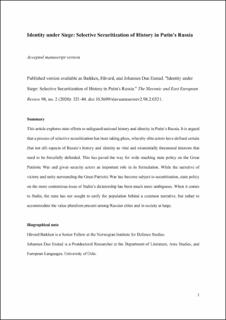| dc.contributor.author | Bækken, Håvard | |
| dc.contributor.author | Enstad, Johannes Due | |
| dc.date.accessioned | 2021-09-30T12:05:25Z | |
| dc.date.available | 2021-09-30T12:05:25Z | |
| dc.date.created | 2019-11-21T14:10:42Z | |
| dc.date.issued | 2020 | |
| dc.identifier.citation | Slavonic and East European Review. 2020, 98 (2), 321-344. | |
| dc.identifier.issn | 0037-6795 | |
| dc.identifier.uri | https://hdl.handle.net/11250/2786643 | |
| dc.description.abstract | This article explores state efforts to safeguard national history and identity in Putin's Russia. It is argued that a process of selective securitization has been taking place, whereby elite actors have defined certain (but not all) aspects of Russia's history and identity as vital and existentially threatened interests that need to be forcefully defended. This has paved the way for wide-reaching state policy on the Great Patriotic War and given security actors an important role in its formulation. While the narrative of victory and unity surrounding the Great Patriotic War has become subject to securitization, state policy on the more contentious issue of Stalin's dictatorship has been much more ambiguous. When it comes to Stalin, the state has not sought to unify the population behind a common narrative, but rather to accommodate the value pluralism present among Russian elites and in society at large. | |
| dc.language.iso | eng | |
| dc.relation.uri | https://www.jstor.org/stable/10.5699/slaveasteurorev2.98.2.0321 | |
| dc.title | Identity under Siege: Selective Securitization of History in Putin’s Russia | |
| dc.type | Peer reviewed | |
| dc.type | Journal article | |
| dc.description.version | acceptedVersion | |
| dc.source.pagenumber | 321-344 | |
| dc.source.volume | 98 | |
| dc.source.journal | Slavonic and East European Review | |
| dc.source.issue | 2 | |
| dc.identifier.doi | https://doi.org/10.5699/slaveasteurorev2.98.2.0321 | |
| dc.identifier.cristin | 1750542 | |
| cristin.ispublished | true | |
| cristin.fulltext | postprint | |
| cristin.qualitycode | 1 | |
